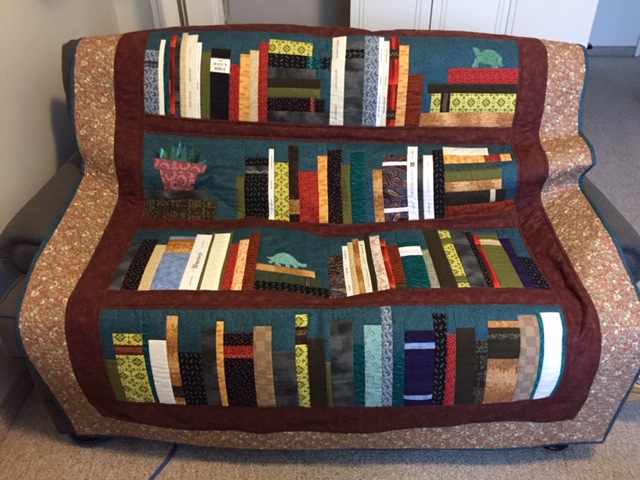What is Sarah Klassen Reading?
By Sarah Klassen
The quilt that covers a small couch in my work space depicts a library. Some of the spines carry the titles of my published books. The rest, left blank by my quilter niece, can represent the books I haven’t read but want to.

I grew up with a hunger for stories in a house with very few books. Our sparse school library and other people’s books helped stave off starvation. Even the drab book—dull illustrations, bland stories, gothic font– from which my mother taught me to read German was a treasure. I still have it.
So what am I reading, now that my home is full of books and the quilt-covered couch an ideal place for reading?
Recently I finished a memoir, I Keep the Land Alive, by Tshaukuesh Elizabeth Penashue. The author, an Innu elder and activist from Labrador, walks the traditional territory of her people, accompanied by friends and family members she’s persuaded to join her in protesting thet forces that are destroying the Innu habitat and way of life: the roar of NATO’s low-flying supersonic fighter jets, test bombing, or hydro projects. While she walks she prays. And writes. The book is an edited, translated version of her journals. It’s a moving account of a strong woman with faith and courage to envision and fight for a healthy future for her children and grandchildren.
Good books are worth rereading, and from time to time I take from the shelf one of Margaret Avison’s poetry collections and savour favorite lines:
Nobody stuffs the world in at your eyes./The optic heart must venture jailbreak/and re-creation..
Or:
For everyone/The swimmer’s moment at the whirlpool comes,/But many at that moment will not say/‘this is the whirlpool, then.’
Last week I brought home from the library a graphic novel, a new kind of reading for me. Enamon, a Japanese manga, is part of a series. A young woman who can’t remember her own life or who she is, possesses an amazing memory in other areas. This engaging story of a troubled wanderer is told through sparse dialogue and page after page of black and white drawings, sometimes intricate, sometimes haunting, always compelling..
With my Libby app I can now read on my phone. I’ve just downloaded Louise Penny’s Kingdom of the Blind to read in bed or waiting at the dentist’s or on the bus. Murder mysteries are not my usual choice, but occasionally I change up my reading diet. I’m well into this story with its colourful characters, a chief inspector under suspicion and an intriguing mystery.
It’s not unusual for me to have several books going at once. Right now I’m well into Ann Patchett’s The Dutch House. I knew I’d be in for a good read. The story is about family dynamics, a subject this author has written about brilliantly in The Commonwealth. Already I’m hooked by the description of the house, its inhabitants and the narrator’s compelling voice. As the family configuration alters, there’s mounting tension between the children’s knowledge and expectations and the puzzling words and actions of the adults.
“Let me not to the marriage of true minds/ Admit impediment,” says Shakespeare (another author worth re-reading). These lines came easily to mind as I read Becoming Mrs Lewis by Patti Callahan. The story of the friendship and love between C.S.Lewis and Joy Davidmn is well known. At least parts of it. Callahan’s well-researched novel offers new insight into the slowly developing relationship between these two remarkable people. This is not a light-hearted romance. And it’s not sentimental: Lewis’s legendary home, The Kilns, is messy and run-down; Lewis’s brother is a back sliding alcoholic; Joy’s aging body becomes more diseased, less able. And there’s no conventional, perfect ending. But what a celebration of the many faces of love.
The most recent book to enter my home is a poetry collection, Geistliche Sonneten, by 17th century Austrian poet Catharina Regina von Greiffenberg. This long-neglected, prolific poet has been receiving attention recently. Two friends and I have for several years been tracking down and downloading her sonnets from the internet and translating them into English. CRvG’s work is characterized by spiritual, often over-the-top fervor, inventive play with the German language, and a fondness for the sonnet form. Here, in translation, are the first lines of a poem in which she defends her use of that form.
Let no one dare deny me heaven’ gentle gifts/The invisible ray, resounding mystery./That noble English artistry. This alone/In time and after time, when all is done, remains.
The newly-arrived book is a bit daunting, but I’ll plunge in.
And I haven’t even mentioned the lit mags that arrive regularly: Today, new issues of Image, Prairie Fire and of course TNQ are waiting for me on my quilt-overed couch.

